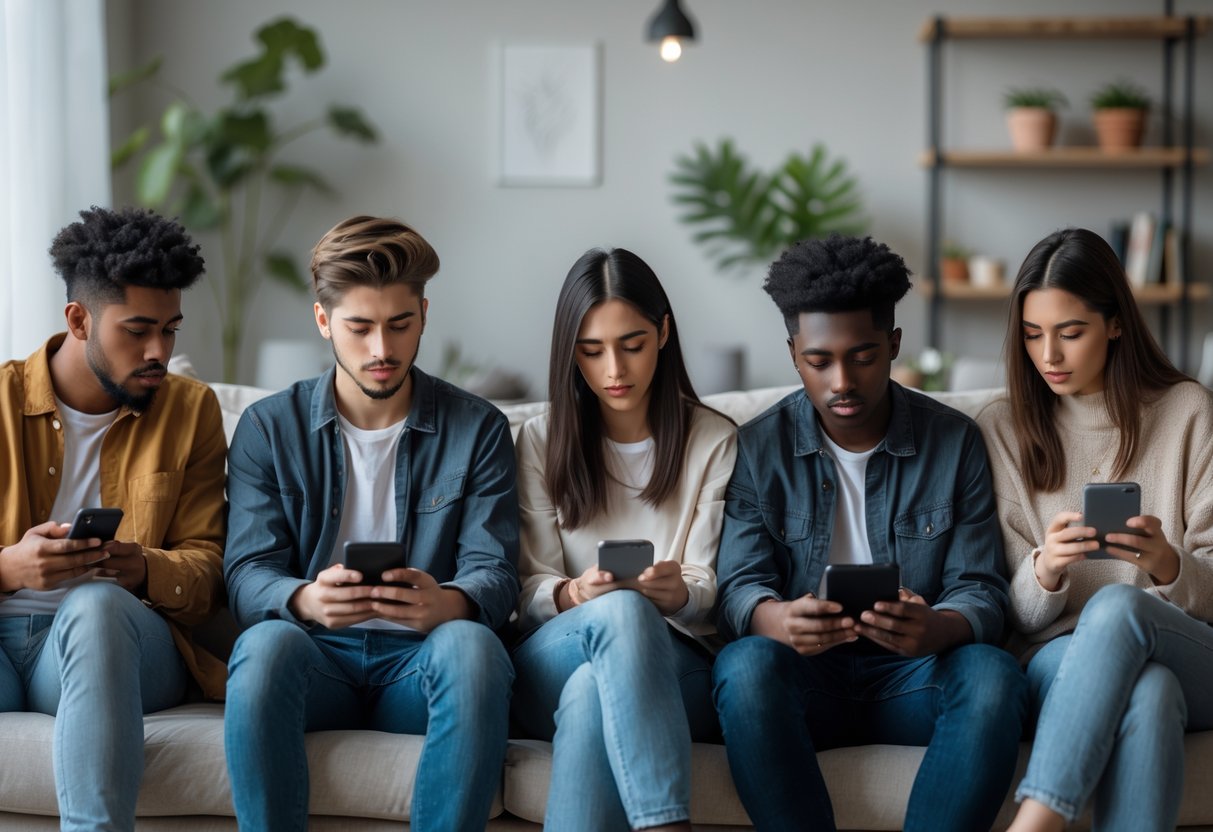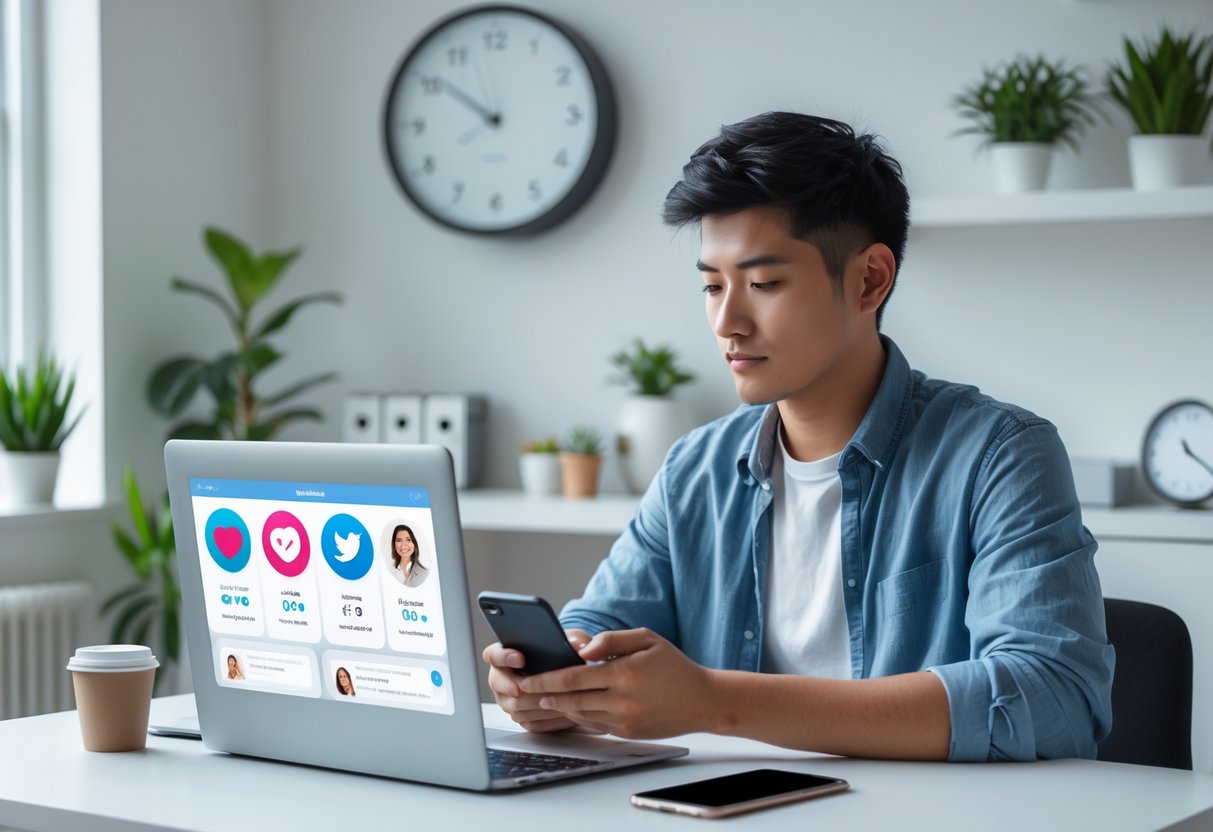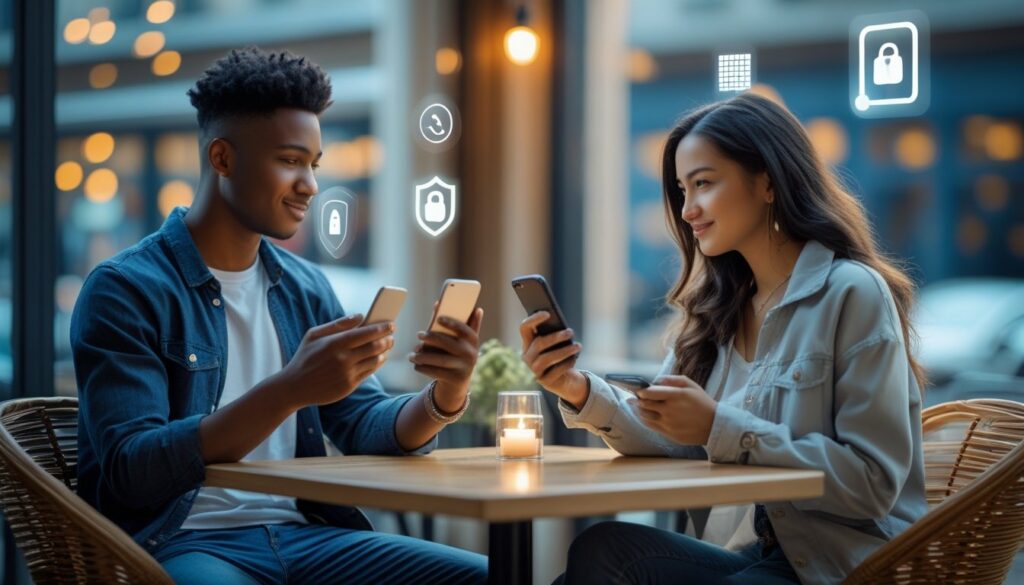Social media has changed how people date and build relationships. Dating apps connect you with potential partners, but they also create new challenges for couples.
You need to think about how much to share online. Decide what photos to post and how to handle your digital life together.

Setting clear social media boundaries helps protect your relationship and keeps both partners feeling comfortable and respected. These boundaries cover everything from who can see your profiles to how you communicate online.
When you and your partner agree on these rules early, you can avoid misunderstandings and build stronger trust.
1) Set Clear Expectations Early

When you start dating someone you met on social media, talk about what you both want. Don’t wait weeks to have this conversation.
Are you looking for something serious? Do you want to keep things casual?
Be honest about your dating goals. If you want a relationship but they only want to hook up, it’s better to know now than later.
Talk about how often you’ll text or call. Some people love constant contact, while others prefer space.
Find what works for both of you. Discuss social media itself.
Will you post photos together? Are you okay with them liking other people’s pictures?
These details can cause problems if you don’t address them early. Setting expectations isn’t about being controlling.
It’s about being clear so no one gets hurt or confused later on.
2) Agree on Privacy Levels

Privacy settings can make or break your dating experience on social media. You and your partner need to talk about what feels comfortable for both of you.
Some people love sharing every detail of their relationship online. Others prefer to keep things more private.
Neither approach is wrong, but you both need to be on the same page. Start by discussing your comfort levels with posting photos together.
Are you okay with being tagged in each other’s posts? Do you want to share relationship milestones publicly?
Talk about what information should stay between you two. Maybe you’re fine with cute couple photos but don’t want personal conversations shared.
Or perhaps you prefer to keep your relationship status private for now. Consider your families and friends too.
They might see your posts and have opinions. Setting boundaries early helps avoid awkward situations later.
Privacy settings can change over time. What feels right at the beginning of your relationship might shift as you get closer.
Check in with each other regularly about these boundaries. The key is honest communication.
3) Respect Each Other’s Tagging Preferences

Some people love being tagged in every photo. Others prefer to stay more private on social media.
Talk to your partner about their tagging comfort level. Do they want you to tag them in couple photos?
Are they okay with being tagged in stories? Maybe your partner doesn’t want to be tagged in certain types of posts.
They might feel uncomfortable with overly romantic captions or specific locations. Ask before you tag them in anything.
This shows you respect their privacy choices. Some couples agree to check with each other before posting photos together.
This prevents awkward situations where one person feels exposed. Your partner might have work reasons for keeping their social media more professional.
They could have family members who follow them and prefer to keep things low-key. Don’t take it personally if they ask you not to tag them sometimes.
It’s about their comfort, not your relationship. Setting clear tagging rules early helps avoid conflicts later.
You can both enjoy social media without stepping on each other’s boundaries. Respecting these differences strengthens your relationship.
4) Avoid Oversharing Personal Details

Sharing too much personal information early on can hurt your dating experience. You might feel excited about a new connection, but slow down.
Don’t post your full name, phone number, or address on dating apps. Keep your home location private until you trust someone.
Avoid sharing financial details like your salary or bank information. Scammers often look for this type of information.
Don’t discuss family problems and past relationships right away. Save these deeper conversations for when you know someone better.
Work details should stay basic at first. Don’t mention your exact workplace or schedule until you feel safe.
Social media handles can reveal too much about your life. Think twice before sharing your Instagram or Facebook profiles.
Wait until you’ve built real trust before opening up about medical information and personal struggles.
Screenshots exist forever. Anything you share could be saved or shared with others without your permission.
Start with basic interests and hobbies instead. Talk about movies, books, or activities you enjoy.
This keeps things light and fun while you get to know each other.
5) Discuss Who Can View Your Profiles

Talk about who can see your dating profiles. Decide if your accounts are public or private.
Should your friends be able to find you on dating apps? What about coworkers or family members?
Some people want their profiles completely private. Others don’t mind if people they know can see them dating online.
Discuss privacy settings on each app you use. Most dating apps let you hide your profile from Facebook friends or contacts in your phone.
You might want different rules for different platforms. Maybe you’re okay with friends seeing your profile on one app but not another.
Talk about what happens if someone you both know finds your profiles. Will you tell them you’re dating? Or do you want to keep things private for now?
Remember that screenshots can be shared. Even with privacy settings, nothing online is completely private.
Make sure you both agree on the same level of privacy. One person wanting to stay hidden while the other shares everything can cause problems.
Check your settings regularly since apps change their privacy options often.
6) Set Boundaries for Online Communication Timing

Decide when you’re available for dating app conversations. Setting clear times helps you avoid feeling overwhelmed by constant messages.
Choose specific hours when you’ll check and respond to messages. Maybe that’s 7-9 PM on weeknights or Sunday afternoons.
Don’t feel pressured to reply immediately to every message. Quick responses can make you seem too eager or available all the time.
Tell potential matches about your communication schedule if needed. You might say, “I usually check messages in the evenings” so they know when to expect replies.
Turn off dating app notifications during work hours or family time. This prevents interruptions when you need to focus on other important things.
Set a “no dating apps” rule for certain times. Many people avoid checking messages right before bed or first thing in the morning.
Healthy relationships need breathing room. Constant texting can actually hurt your chances of building a real connection with someone special.
7) Decide Together on Friend Requests

When you’re dating someone, friend requests can create tension. Should you accept that request from your ex?
What about your partner’s coworker who keeps liking their photos? The best approach is making these decisions together.
Talk openly about who you’re comfortable with each other adding on social media. Some couples decide to discuss any friend requests from exes before accepting.
Others agree to avoid adding people they’ve had romantic history with. You might also want to talk about coworkers or friends of the opposite gender.
What feels okay to both of you? Don’t make these rules to control each other.
Instead, create guidelines that help you both feel secure and respected. If someone sends a friend request that makes you uncomfortable, talk to your partner about it.
They should listen to your concerns and work with you to find a solution. These boundaries can change over time.
As your relationship grows stronger, you might feel more comfortable with certain friend requests.
8) Don’t Post About Arguments Online

When you’re mad at your partner, social media might seem like the perfect place to vent. But posting about your fights online is one of the worst things you can do for your relationship.
Your followers don’t need to know every detail of your disagreements. These posts make both you and your partner look bad.
Would you want your boss or family reading about your relationship drama? Once you post something online, you can’t really take it back.
Fighting on social media also brings other people into your private business. Friends and family might take sides or give unwanted advice.
Your partner will probably feel embarrassed and betrayed when they see your post. This makes the original problem much worse.
Instead of posting when you’re upset, talk to one trusted friend or family member. You can also write in a private journal or talk directly to your partner.
Arguments are normal in relationships. How you handle them shows your maturity and respect for your partner.
9) Keep Dating Life Off Group Chats

Group chats are fun spaces to connect with friends. But they’re not the right place for your dating updates.
When you share too much about your love life, it can make friends uncomfortable. Not everyone wants to hear about every date or relationship drama.
Your dating stories might also spread beyond the group. Friends sometimes share information without thinking about it first.
Keep your romantic updates for one-on-one conversations instead. This lets you control who knows what about your personal life.
You can still ask friends for dating advice. Just do it in private messages or phone calls.
Group chats work better for general topics everyone can enjoy. Save the dating details for closer friends who actually want to hear them.
This boundary helps you maintain better friendships. Your friends will appreciate not being overwhelmed with romantic updates they didn’t ask for.
10) Agree on Sharing Location Services

Location sharing can be a sensitive topic in dating. Some people like knowing where their partner is, while others prefer more privacy.
Talk openly with your partner about location sharing. Decide together if you both want to share your location or keep it private.
Many dating apps and phones offer location sharing features. These tools can help with safety.
If you choose to share locations, set clear rules together. Decide if you’ll share all the time or only during dates, and when it’s okay to turn it off.
Location sharing should feel safe for both of you. If your partner pressures you to share when you don’t want to, that’s a red flag.
Some couples use location sharing for practical reasons, like meeting up or making sure each other gets home safely.
Make sure you both agree on what feels comfortable. Find a balance that works for your relationship.
11) Respect Each Other’s Digital Space

Your partner’s social media is their personal space. You wouldn’t read their diary, so don’t scroll through their entire Instagram history.
Give each other space online. Avoid commenting on every post or liking old photos.
You don’t need to be tagged in everything. Your partner can post without mentioning you, and that’s normal.
Don’t check their activity constantly. Monitoring when they post or who likes their photos can become unhealthy.
Trust is important. If you feel the urge to monitor their digital life, talk about your concerns.
Everyone needs some online independence. You both had social media lives before dating, and it’s okay to keep that.
Set clear expectations together. Agree on what you’ll keep private and how you’ll handle major announcements.
Aim for balance. Share your lives together, but remain individuals online.
12) Avoid Comparing Each Other on Social Media

Social media makes it easy to compare your relationship to others. You see perfect couples online and might feel insecure.
Don’t compare your partner to people you see online. Those posts show highlights, not real life.
Everyone shows love differently. Some are private, others share everything.
Comparing creates stress and can lead to jealousy. These feelings can damage your relationship.
Focus on what works for you and your partner. Your relationship is unique.
Social media only shows the good moments. People rarely post about fights or bad days.
Talk to your partner about how social media affects you. Set boundaries together about what you’ll share and what stays private.
13) Allow Each Other to Have Separate Online Lives

You don’t need to share every social media account with your partner. Separate online spaces are healthy.
It’s fine to have friends your partner doesn’t follow. You can post without including them every time.
Your partner shouldn’t ask for all your passwords or demand to check your messages.
You probably have different friend groups in real life. The same goes for online spaces.
Having separate digital lives means keeping your own identity. It doesn’t mean you’re hiding something.
Share special moments together if you want, but remember you’re both individuals.
Trust your partner to make good choices online. If you feel the need to monitor them, there may be deeper issues to address.
Set clear boundaries about what you’re comfortable sharing. Some couples post everything, others keep things private.
14) Set Rules for Posting Couple Photos

Talk with your partner before posting couple photos. This helps prevent misunderstandings.
Decide together how many photos you want to share. Some couples post often, others rarely.
Ask before posting pictures. Your partner might not like how they look in some photos.
Pick photos you both like. Avoid posting unflattering pictures of your partner.
Discuss what types of photos you’re comfortable sharing. Beach pictures, date nights, and special events are usually safe.
Set limits on how personal your photos can be. Decide what stays private.
Think about who will see your photos, like family or coworkers.
Remember, online photos last a long time. Consider if you’ll want them public in the future.
Start with fewer photos if you’re unsure. It’s easier to post more later than to remove pictures.
15) Be Honest About Online Interactions with Others

Honesty builds trust in your relationship. Tell your partner about important online interactions with others.
You don’t need to share every message. Be open about meaningful conversations.
If you’re chatting with an ex or getting flirty messages, let your partner know.
Being honest helps prevent problems later. If your partner finds out on their own, they might feel betrayed.
Set boundaries together about what’s okay. Some couples are fine with casual chatting, others set limits.
Talk about these topics openly. Don’t delete messages or hide your phone.
If someone crosses boundaries with you online, tell your partner. They can help you decide what to do.
Honesty should go both ways. You have the right to know about your partner’s online interactions, too.
Why Boundaries Matter in Social Media Dating

Setting clear limits protects your personal information and builds respect between you and your partner. Boundaries help keep you safe and support healthier connections online.
Protecting Your Privacy
Your personal information is valuable. Sharing too much too soon can put you at risk.
When you post about your daily routine, you give strangers access to details they don’t need.
What to keep private early on:
- Your exact location and address
- Work schedule and workplace details
- Phone number and personal email
- Financial information
- Family photos and details about relatives
It’s easy to overshare on social media. Posting a photo at your favorite coffee shop every morning tells people where to find you.
Think before you tag locations. Wait until you trust someone before sharing places you visit often.
Your digital footprint lasts forever. Screenshots can capture anything, even if you delete it.
Be careful about what you share to protect yourself now and in the future.
Building Mutual Respect
Boundaries show people how to treat you. If you’re clear about your limits, you attract those who respect them.
Signs someone respects your boundaries:
- They don’t pressure you to share more than you want
- They listen when you say no
- They don’t stalk your profiles
- They respect your posting schedule and don’t demand updates
Healthy relationships start with mutual respect. If someone gets angry when you won’t share your location or personal details, pay attention to that.
Your comfort matters. Don’t feel pressured to share photos or stories that make you uncomfortable.
People who care about you will support your need for privacy and personal space online.
Navigating Communication and Expectations

Clear communication helps you avoid misunderstandings and build trust. Setting boundaries around messaging and public interactions protects your privacy as you get to know someone.
Setting Healthy Messaging Limits
How often should you text someone you just met online? Many people worry about this.
Start with reasonable response times. You don’t have to reply instantly. Waiting a few hours is normal.
Set limits on late-night texting. Messages after 10 PM can feel intrusive, especially early on.
Consider these messaging boundaries:
- Reply within 24 hours during the week
- Keep weekend response times flexible
- Avoid sending multiple messages in a row
- Don’t expect immediate replies to every text
If someone gets upset about your response time, notice how they handle your boundaries.
Handling Public Interaction
Social media interactions can get complicated when you start dating someone new. You might wonder if you should like their photos or comment on their posts.
Keep public interactions light at first. Liking photos occasionally is fine, but avoid commenting on everything they post.
If you tag them in posts or stories without asking, you might make them feel awkward. Always check with them before making your relationship public online.
Follow these public interaction guidelines:
- Like posts sparingly in the beginning.
- Avoid commenting on old photos.
- Don’t interact with their ex’s posts.
- Ask before posting photos of them.
Their friends and family can see your interactions. Keep things respectful and appropriate for everyone.




